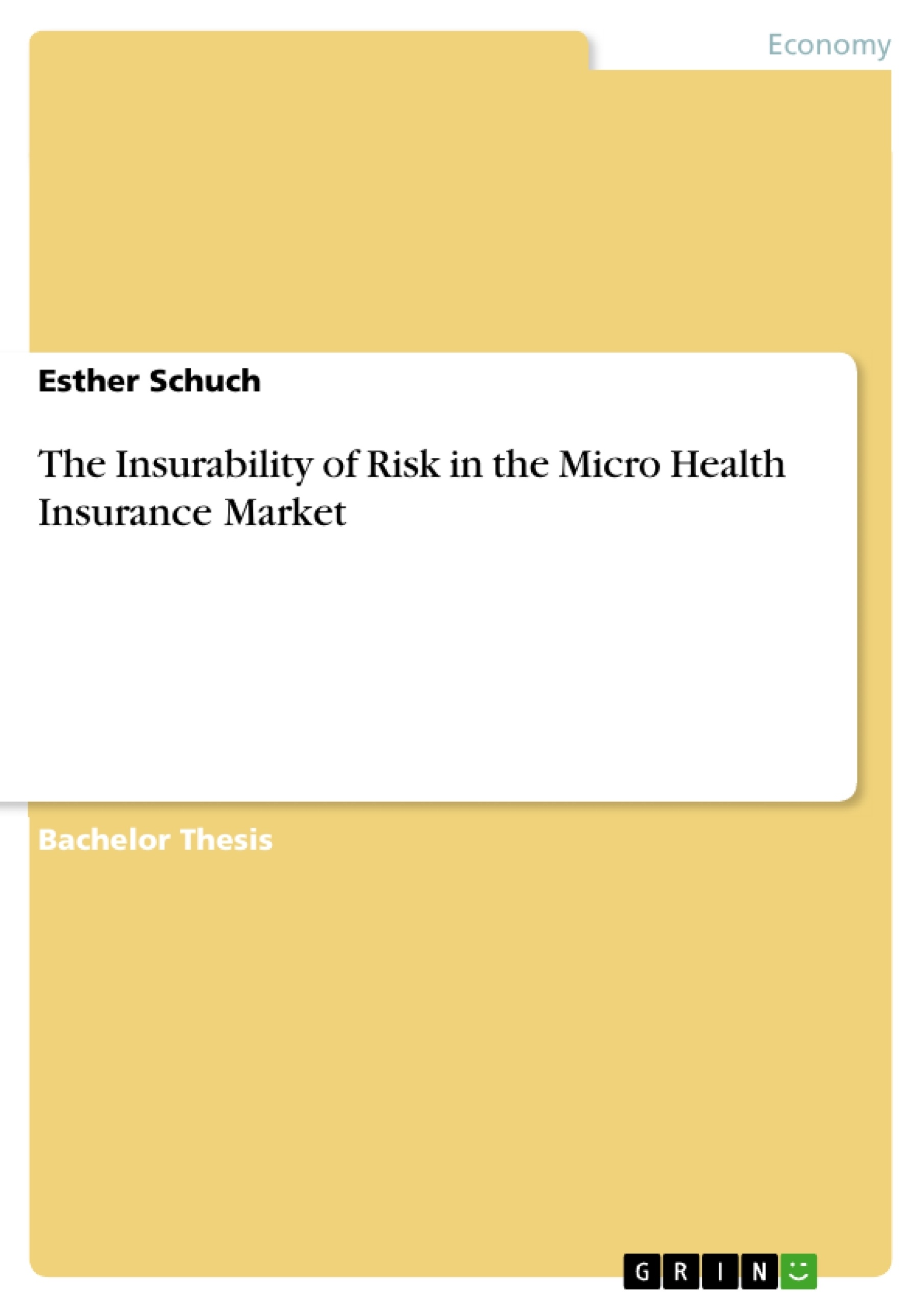The desirability of micro health insurance is usually beyond doubt but the sustainable provision is a different matter. Even traditional insurance economics have issues which complicate the adequate coverage of risks but the problems in the microinsurance environment are even more dicult to handle. When looking for an approach on how to analyse risks in micro health insurance and how to insure them one will fail to find one. So far, data is very rare. Usually it is only possible to find a small amount of data extracted out of small scale studies/ evaluations. The microinsurance database of the World Bank is an attempt to collect all kinds of relevant data concerning microinsurance but so far, there is only some basic data for six countries.
Recently there has been the attempt to start an analytical framework on how to assess insurability of risk in microinsurance. Biener and Eling provide a starting point by adjusting the insurability criteria of Berliner to a microinsurance environment. This paper will continue the work in the area of micro health insurance and suggests a further criterion to be used when assessing the insurability of risk.
Inhaltsverzeichnis (Table of Contents)
- Relevance of Micro Health Insurance
- Health Insurance Economics
- The principles of Insurance
- Adverse Selection
- Moral Hazard
- Micro Health Insurance
- Risk and Insurability
- The Concept of Risk.
- The Concept of Insurability
- Insurability in Micro Health Insurance
- Adaptation of Berliner's Criteria
- Actuarial Criteria
- Market Criteria
- Societal Criteria
- Discussion and the way forward
Zielsetzung und Themenschwerpunkte (Objectives and Key Themes)
This Bachelor thesis examines the insurability of risk in the micro health insurance market. The work aims to develop a framework to assess the feasibility of micro health insurance products in the context of developing countries. The thesis explores the theoretical foundations of insurance economics, particularly in relation to micro health insurance. The key themes include:- The role of micro health insurance in reducing poverty and improving access to healthcare in developing countries
- The challenges of adverse selection and moral hazard in micro health insurance markets
- The development and application of criteria to assess the insurability of risks in the micro health insurance market
- The importance of considering market and societal factors when evaluating the feasibility of micro health insurance products
Zusammenfassung der Kapitel (Chapter Summaries)
- Relevance of Micro Health Insurance: This chapter introduces the growing field of microfinance and its expanding focus on microsavings and microinsurance. It highlights the importance of micro health insurance in tackling poverty and the challenges posed by inadequate health systems in developing countries. The chapter emphasizes the issue of out-of-pocket medical expenses and its detrimental impact on poor households, particularly the 'medical poverty trap'.
- Health Insurance Economics: This chapter delves into the fundamental principles of insurance economics, covering concepts such as adverse selection and moral hazard. It explores how these concepts manifest in the context of micro health insurance, posing challenges for the successful provision of insurance products.
- Risk and Insurability: This chapter defines the concepts of risk and insurability, providing a framework for analyzing the insurability of risks in the micro health insurance market. It lays the groundwork for assessing the feasibility of providing insurance products to specific populations.
- Insurability in Micro Health Insurance: This chapter focuses on applying the concepts of risk and insurability to the specific context of micro health insurance. It introduces and adapts Berliner's criteria to assess the insurability of risks, considering actuarial, market, and societal factors. These criteria provide a comprehensive framework for evaluating the feasibility of micro health insurance products.
Schlüsselwörter (Keywords)
The main keywords and focus topics of this Bachelor thesis include micro health insurance, adverse selection, moral hazard, insurability, risk, developing countries, poverty alleviation, out-of-pocket spending, medical poverty trap, Berliner's criteria, actuarial criteria, market criteria, societal criteria, and the World Health Organisation (WHO). These terms represent the core concepts explored in the work, providing insight into the challenges and opportunities associated with providing micro health insurance products in developing economies.Frequently Asked Questions
What is micro health insurance?
It is a financial tool designed to provide healthcare coverage to low-income households in developing countries, helping them avoid the 'medical poverty trap'.
What are the main economic challenges in micro health insurance?
The primary challenges include 'Adverse Selection' (where only high-risk people sign up) and 'Moral Hazard' (where insured people may use more services than necessary).
How is the insurability of risk assessed in this market?
The thesis adapts 'Berliner’s criteria' to the microinsurance environment, evaluating risks based on actuarial, market, and societal factors.
What is the 'medical poverty trap'?
It describes a situation where poor households are forced into deeper poverty due to high out-of-pocket medical expenses for unexpected illnesses.
Why is data scarcity a problem for micro health insurance?
Sustainable insurance requires accurate data to calculate premiums; however, in many developing countries, relevant data is rare or limited to small-scale studies.
What criteria does the thesis suggest adding to the assessment?
The paper suggests a further criterion for assessing the feasibility of risk beyond the adjusted criteria provided by Biener and Eling.
- Citation du texte
- B.A., B.Sc. Esther Schuch (Auteur), 2013, The Insurability of Risk in the Micro Health Insurance Market, Munich, GRIN Verlag, https://www.grin.com/document/215920



